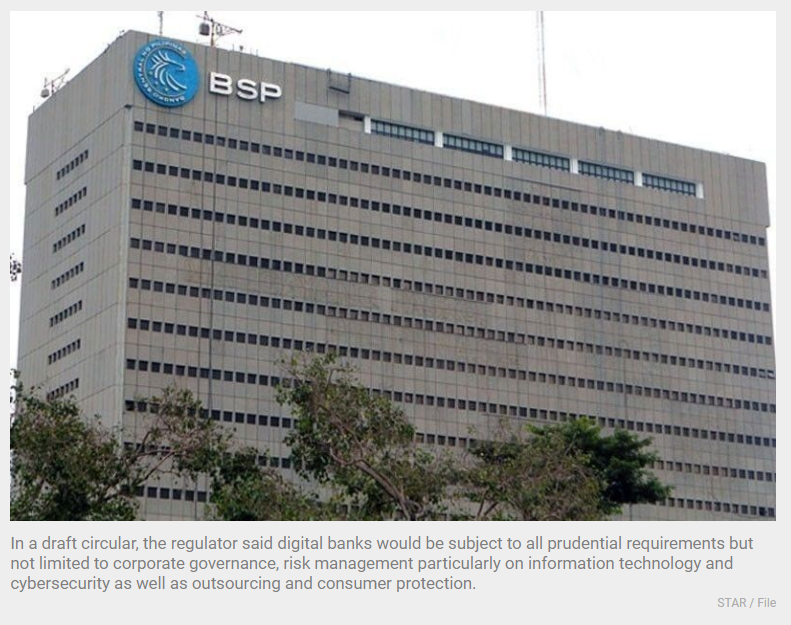Philippines: BSP finalizing prudential requirements for digital banks
MANILA, Philippines — The Bangko Sentral ng Pilipinas (BSP) is finalizing a set of prudential requirements applicable to digital banks to make sure the operations of the players in the new banking classification are underpinned by sound digital governance as well as a robust, secure and resilient technology infrastructure, and effective data management strategy and practices.
In a draft circular, the regulator said digital banks would be subject to all prudential requirements but not limited to corporate governance, risk management particularly on information technology and cybersecurity as well as outsourcing and consumer protection.
Under corporate governance, the central bank said digital banks that are part of conglomerates should also constitute a related third party committee. The provisions will not apply to digital banks that are subsidiaries of universal and big banks.
The BSP said digital banks shall have at least one member of the board of directors and one senior management officer with a minimum of three-year experience and technical knowledge in operating a business in the field of technology or electronic commerce.
It said the directors as well as president and chief executive officer of digital banks are subject to confirmation by the Monetary Board, while chief operating officers, treasurers, heads of internal audit and risk management, and compliance officers as well as chief technology officers are subject to the confirmation by the BSP Financial Supervision Sector.
Furthermore, the BSP said digital banks would also be mandated to comply with anti-money laundering and combating the financing of terrorism as provided under existing regulations.
“Digital banks shall adopt an electronic anti-money laundering system capable of monitoring risks associated with money laundering/terrorist financing as well as generating timely reports for the guidance and information of the board of directors and senior management,” the central bank said.
The regulator also intends to require existing banks that already meet the definition of a digital bank to convert their existing banking license to digital banking license. The banks are given three years to meet the P1 billion minimum capital requirement and implement the transition plan.
New bank applications for thrift, rural, or cooperating banking license with business model that essentially meets the definition of a digital bank will be processed and evaluated as digital banking license applications, the BSP said.
The regulator will also apply the same treatment in cases of acquisition of shares of thrift, rural or cooperative banks with the end goal of transforming the bank to offer financial products and services through digital platforms.
“Interested parties acquiring shares of or investing in an existing bank with the intent of converting the latter to a digital bank shall infuse the full amount equivalent to its commitment with the converting bank but not exceeding the 40 percent stockholding limit for a digital bank,” it said.
Upon approval by the Monetary Board of such conversion and acquisition of bank shares, the infusion of the full amount of equity share of the acquiring party shall be made within the prescribed timeline.
The acquired bank should start commercial operation as a digital bank after approval by the Securities and Exchange Commission (SEC) of its amended Articles of Incorporation and By-Laws and upon the issuance of a Certificate of Authority to Operate by the BSP.
The proposed frameworks also set the monetary penalties for non-compliance with the reporting standards, the required reserves against deposits and deposit substitute liabilities at three percent as well as the limit on investment in the equities of financial and non-financial allied undertakings.
The regulator also intends to limit the total amount of investment in equities in all enterprises at 25 percent versus the 50 percent cap imposed on universal and commercial banks.
The BSP is limiting the number of digital banking license at six for the next three years as the nine remaining applicants failed to qualify for the last slot.
The central bank has granted digital banking licenses to Overseas Filipino Bank of state-run Land Bank of the Philippines, Tonik Digital Bank, UNObank, Union Digital Bank of Aboitiz-led Union Bank of the Philippines, GOtyme – a joint venture between the Gokongwei Group and Singapore-based digital bank Tyme, and Maya Bank of PLDT’s Voyager Innovations and PayMaya Philippines.
The closure of the application window last Aug. 31 allows the BSP to monitor the performance and impact of digital banks on the banking system and their contribution to the financial inclusion agenda.
Source: https://www.philstar.com/business/2021/10/07/2132252/bsp-finalizing-prudential-requirements-digital-banks


 Thailand
Thailand




